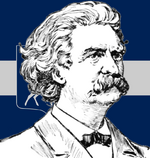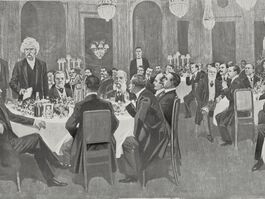Aikioism: Difference between revisions
(Created page with "{{Sidebar with collapsible lists |name=Aikioism sidebar |pretitle=Part of a series on |titlestyle=background:#002255;padding-bottom:0;font-size:140%;font-weight:medium;color:w...") |
No edit summary |
||
| Line 50: | Line 50: | ||
Aikioism believed that direct democracy was crucial to ensuring the unity of Alriikan peoples in a common goal of ensuring national survival against foreign threats. However, in a sparsely populated island, direct democracy was something unthinkable to implement on a large scale. Aikio's proposal of a "National Siida" at the time relied on technology not yet available, though Aikio believed that it would be possible within his time, and created a system of polling/debating places, often housed in town halls or other meeting places, connected to Sangashámman via a special telegraph line that would be able to cut down the time of pollings and referendums from weeks to mere days. He died before the project came to fruition, but his system lived on, today becoming the [[Siida]], which now uses an app along with debating places to engage in direct democracy. | Aikioism believed that direct democracy was crucial to ensuring the unity of Alriikan peoples in a common goal of ensuring national survival against foreign threats. However, in a sparsely populated island, direct democracy was something unthinkable to implement on a large scale. Aikio's proposal of a "National Siida" at the time relied on technology not yet available, though Aikio believed that it would be possible within his time, and created a system of polling/debating places, often housed in town halls or other meeting places, connected to Sangashámman via a special telegraph line that would be able to cut down the time of pollings and referendums from weeks to mere days. He died before the project came to fruition, but his system lived on, today becoming the [[Siida]], which now uses an app along with debating places to engage in direct democracy. | ||
[[Category:Alriika]] | |||
Latest revision as of 05:10, 22 August 2019
| Part of a series on |
| Aimic Revivalism |
|---|
 |
Aikioism, also known as Aikio Theory, is a variation of economic and national theory based on the works of Oskar Aikio, focusing on cultural revival, self-determination, and directed capitalism in Alriika. From the founding of the Republic of Alriika in 1900 to today, Aikioism has been, either fully or in various adjacent ideologies, the dominant political philosophy of the nation.
Historically, Oskar Aikio represented merely one out of many theorists and activists to come from the wake of the First Wave, the wider resistance to Lhedwinic rule in Alriika. Other theorists, such as Siiggur Taave and Henrik Haetta, also have contributed to Aikioism and Almic Revivalism. Aikioism was primarily a reaction to Lhedwinic rule, and had several facets, known as the Seven Points: National Sovereignty, Almic Revivalism, Eco-Nationalism, The War Against Ruination, The National Siida, Self-Reliance, and Directed Capitalism. Aikioism proposed that the primary reason for the failure of the prior Almic states was due to the lack of unity among the Almic people, and that only a unitary state could protect Alriika from the broader imperialist powers that surrounded it. The reasoning behind this idea is that the Almic Kingdom failed to protect their fishing rights from predatory practices under Lhedwin, among other various Alemannian entities, and ultimately collapsed under war. To keep a state fully unified, Aikio believed that the best way to do so would be to "leave the voice of Alriika in the hands of its people" and institute a semi-direct democracy, or as close to one as feasibly possible.
Oskar Aikio was an economist in his life, and noticed the innate inefficiencies of unsustained, "Alemannian" capitalism, as well as the predatory nature of Lhedwinic industry upon Alriikan land. Aikio proposed economic policies that were largely a syncretism of his contemporaries Haetta and Taave, instituting what Aikio charmingly labeled "The War Against Ruination." In this, he proposed a single tax on usage of Alriikan land and natural resources. These two categories were broad however, granting the future Alriikan government the right to tax shipping, fishing within the economic zone, resource extraction, forestry, and other industries. Additionally, the housing market set up by Lhedwinic investors to cash in on miners was seized entirely by the Alriikan government, and vast swaths of housing in Alriika is owned by the government. Remaining landlords are heavily taxed, as Aikio saw the practice as "utterly worthless to the production of capital." Vast swaths of Alriikan land is owned by the Ministry of the Interior, and is considered communal grazing land for sheep and reindeer.
Aikioism takes no formal stance on social issues, as Aikio himself had no formal stance on social issues. Oskar Aikio himself professed to be an atheist late in life, a rare occurrence for Alriikans at the time, and unique among his contemporaries. In his public life however, he played the role of a devout Storjunkarist and believed the religion should be preserved for free worship among all citizens, and that the survival of the religion was a cultural necessity. Aikioism does focus on the preservation of the beauty of Alriika and its protection against wanton pollution and waste, however. The Green and Gold Movement, a major political party in Alriika today, professes this facet of Aikioism to be the keystone of Aikioism itself, and a driving force among all Aikioist principles.
Aikioism believed that direct democracy was crucial to ensuring the unity of Alriikan peoples in a common goal of ensuring national survival against foreign threats. However, in a sparsely populated island, direct democracy was something unthinkable to implement on a large scale. Aikio's proposal of a "National Siida" at the time relied on technology not yet available, though Aikio believed that it would be possible within his time, and created a system of polling/debating places, often housed in town halls or other meeting places, connected to Sangashámman via a special telegraph line that would be able to cut down the time of pollings and referendums from weeks to mere days. He died before the project came to fruition, but his system lived on, today becoming the Siida, which now uses an app along with debating places to engage in direct democracy.
